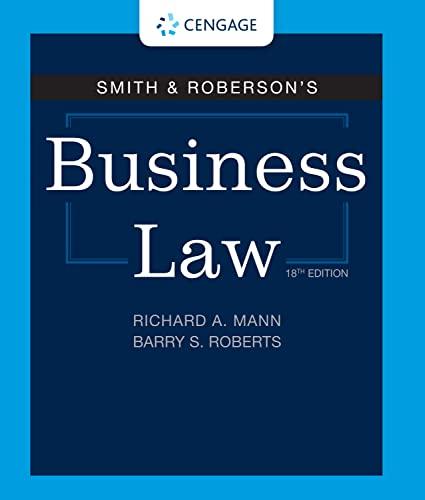Question
Hello, according to probable cause and applying prong which is an essential element of a claim or defense, you could help me by applying these
Hello, according to probable cause and applying "prong" which is an essential element of a claim or defense, you could help me by applying these elements in this case. HYPO Officer Clifford was called to a grocery store because there had been a reported robbery. On driving up, he saw Mr. Robot running away holding a box of cereal and milk. He had previously arrested Mr. Robot for theft. Officer Clifford arrested Mr. Robot and searched him. He found that he had a receipt for the items he had purchased. Mr. Robot has now brought a claim under the 4th Amendment of the U.S. Constitution.
Definition Probable cause is a requirement found in the Fourth Amendment that must usually be met before police make an arrest, conduct a search, or receive a warrant. Courts usually find probable cause when there is a reasonable basis for believing that a crime may have been committed (for an arrest) or when evidence of the crime is present in the place to be searched (for a search). Under exigent circumstances, probable cause can also justify a warrantless search or seizure. Persons arrested without a warrant are required to be brought before a competent authority shortly after the arrest for a prompt judicial determination of probable cause.
Overview Constitutional Basis Although the Fourth Amendment states that "no warrants shall issue, but upon probable cause", it does not specify what "probable cause" actually means. The Supreme Court has attempted to clarify the meaning of the term on several occasions, while recognizing that probable cause is a concept that is imprecise, fluid and very dependent on context. In Illinois v. Gates, the Court favored a flexible approach, viewing probable cause as a "practical, non-technical" standard that calls upon the "factual and practical considerations of everyday life on which reasonable and prudent men [...] act".1 Courts often adopt a broader, more flexible view of probable cause when the alleged offenses are serious.
Application to Arrests The Fourth Amendment requires that any arrest be based on probable cause, even when the arrest is made pursuant to an arrest warrant. Whether or not there is probable cause typically depends on the totality of the circumstances, meaning everything that the arresting officers know or reasonably believe at the time the arrest is made.2 However, probable cause remains a flexible concept, and what constitutes the "totality of the circumstances" often depends on how the court interprets the reasonableness standard.3
A lack of probable cause will render a warrantless arrest invalid, and any evidence resulting from that arrest (physical evidence, confessions, etc.) will have to be suppressed.4 A narrow exception applies when an arresting officer, as a result of a mistake by court employees, mistakenly and in good faith believes that a warrant has been issued. In this case, notwithstanding the lack of probable cause, the exclusionary rule does not apply and the evidence obtained may be admissible.5 Unlike court clerks, prosecutors are part of a law enforcement team and are not "court employees" for purposes of the good-faith exception to the exclusionary rule.6
Step by Step Solution
There are 3 Steps involved in it
Step: 1

Get Instant Access to Expert-Tailored Solutions
See step-by-step solutions with expert insights and AI powered tools for academic success
Step: 2

Step: 3

Ace Your Homework with AI
Get the answers you need in no time with our AI-driven, step-by-step assistance
Get Started


